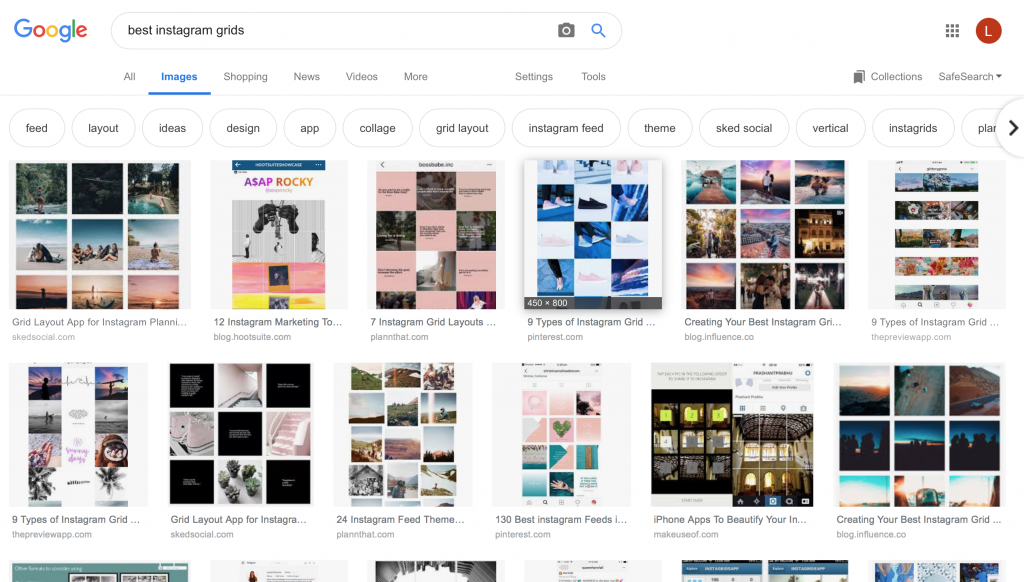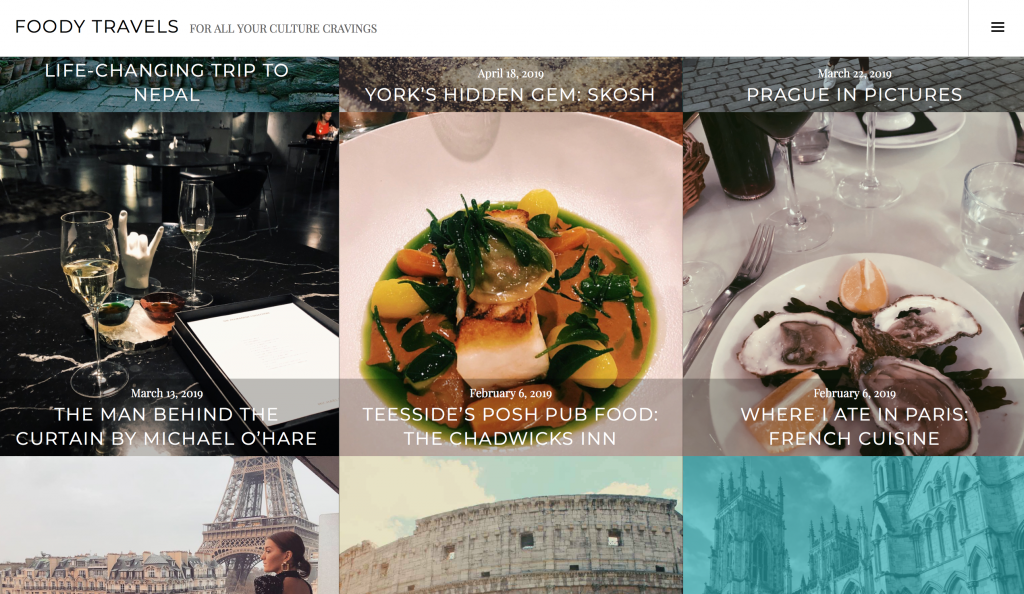Initial ideas/thought processes/what I want to achieve:
My very initial idea stemmed from what I personally would look for in a platform. Now, there are influencers being sent to model clothes and try foods and be in ‘it’ locations. This has never really impressed me. I have always admired places others are flocking to and things people are wearing, but the most important thing is to go where I want and do it my way. Creating There are patterns beginning to emerge where bloggers are travelling places as a commercial venture. I want to see what normal people get up to on their travel and food adventures which are not a huge business, or a commercial motive. Many people are food & travel blogging, many of the sites are cluttered and in so much depth. This is what I did not want to achieve, the intention was to create an aesthetically pleasing, simplistic and modern blog, with the front page being pictures and titles. After looking to Instagram for most of my travel and food inspirations, I always found I wanted to know more, but the blogs were far too intense on the person writing it, whom I have minimal interest in. Anecdotes, experiences and tips were useful. But many of these successful bloggers become their own brand by making it all about them. I aim to take what I like from other blogs such as writing style and content type but make it original and display a range of content. The Luxury Editor is an amazing blog for content and has quite a clean layout compared to the others but it only covers one type of content which is why it is successful. I have a different vision for Foody Travels, I aim for the content to be on alternative ways of doing things from experience. Not the usual hotel holiday, cruising, hiring a chateau, walking holidays, camping, a variety of different places to eat along the way in separate posts. An organised, Instagram-like way of blogging.
I hope for Foody Travels to act as an Instagram style travel blog which offers the unanswered questions of an Instagram page. For example, when I view a travel blogger on Instagram, there are so many things which do not apply to normal people who are not being paid massive amounts of money to go on holiday. My blog will be a range of my tips and experiences on different ways to travel and places to go/types of cuisine. It will not be focused on all the ‘It’ places to go.
Initial research:
A Facebook study found that 67 per cent of travel enthusiasts on Instagram use the platform to look for inspiration for new places to travel to. And a similar number (62 per cent) used Instagram to build excitement for new trips. (Eric Mark Do, Global News 2018)
The inspiration behind the blog was Instagram, as it now acts as a muse for travel and food inspirations by impressive images as lead content and a brief caption. I first needed to assess the current state of food and tourism and how Instagram was developing as a popular platform.
World Travel Food Association sent me a copy of the report to help better understand the research being done and the current state of food and drink tourism:
SUBSTANTIAL BENEFITS ARE NOT FULLY REALIZED
“Food and drink experiences are certainly entertaining and enjoyable for travelers, but these experiences can provide additional substantial benefits, positively impacting everyone, from visitors to local businesses and residents. Besides the obvious economic impact, food tourism can benefit us by creating cross-cultural connections, preserving heritage and traditions, and contributing to the sustainability of destinations and their culture.”
This highlighted the importance of tourism on residents and local areas to maintain culture. It also shows an area of demand, food tourism/blogging, therefore, is a positive thing, which simplifies the process. It would be beneficial from a marketing point of view, for me to incorporate this into the blog posts to demonstrate an understanding of how local cuisine can be fantastic to maintain culture rather than visiting chains which are not part of the local economy as much. The blog content will focus on things to do outside of the basic hotel resort. Giving mention to many places which are not chain restaurants and were discovered sometimes ‘off the beaten track’. Cultural values and stories will be included in the content to give context and reach an audience who are interested in the culture behind a place or food.
This could create a good impression for local businesses and encourage them to contact me for further work or spotted by similar companies.
As someone actively using social media, I wanted to achieve a blog which was relaxed, not complex in layout or content. On my personal account, I often post travel and food posts and feel there is so much more to share on this. The popularity of travel posting on Instagram has become immense. It is now seen as a normal thing to post ‘throwbacks’ or a culture dose of a past or present holiday. People using Instagram often have disposable income. Research from
adespresso.com in 2018 says:
- 31% of people who make more than 75k per year are on Instagram
- 32% of people who make between 50k-74k per year are on Instagram
- 32% of people who bring in 30k to 49k per year are on Instagram.
This helps identify my audience as I want to base the blog on Instagram as an added extra. Statsita found users of Instagram based on age groups in April 2019 which found the main audiences were female 18-24 and 25-34-year-olds. I will advertise my blog on a personal and a Foody Travels account to generate views by them clicking through.
Instagram is also a growing platform which has taken over Twitter and Pinterest users.
adespresso.com 2018: As of June 2018, there are nearly 1 billion monthly active users of Instagram. This positions Instagram behind Facebook (1.4 billion) but ahead of most other social network sites, including Twitter (68 million) and Pinterest (250 million). Also, images on Instagram get 23% more engagement than Facebook. Therefore there is an appeal to this image led platform, especially amongst the younger ABC1 demographic.
MAIN AREAS FOR IMPROVEMENT
Specific areas for improvement in food tourism include opportunities for stakeholders to work together and align plans and strategies to ensure that authentic and local experiences are offered sustainably to maintain local heritage and educate all locals. Food tourism contributes to economic sustainability, sociocultural sustainability, and environmental sustainability. It is therefore important for food and drink experiences to generate positive economic impact and also protect local heritage. While food tourism is often seen as providing experiences and benefits to tourists, it has important outcomes for residents.
Design Ideas:
I wanted a grid-like layout such as Instagram, the design process what straight forward as I know what I like, modern, clean, simple. I was looking on Google for the best Instagram grids, and most of them were clean and travel themed.


I knew I wanted images as the front page and fortunately, I found the ‘cubic’ design on my WordPress plan and immediately stuck with it. I found this a while ago.
I feel content with the design it is exactly what I wanted.
